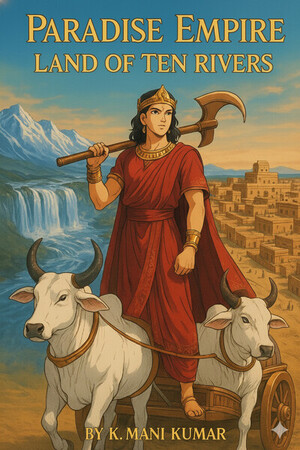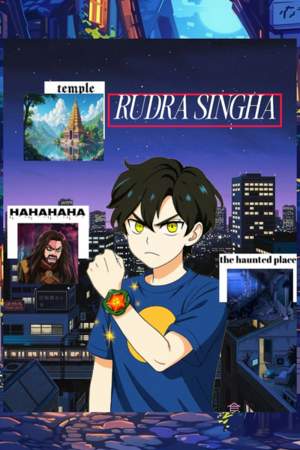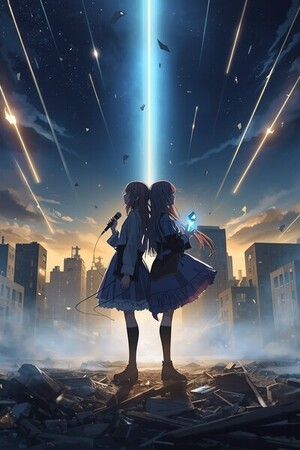Chapter 21:
Chapter 7: రాజ పట్టాభిషేకం (Rāja Paṭṭābhiṣēkaṁ) — The Royal Coronation Part 3: Raghavendra the System Breaker!
The Paradise Empire: The Land of Ten Rivers season 1 part 1
Paradise Empire: The Land of Ten Rivers
Chapter 7: రాజ పట్టాభిషేకం (Rāja Paṭṭābhiṣēkaṁ) — The Royal Coronation
Part 3: Raghavendra the System Breaker!
(Scene opens: The Grand Coronation Complex. Outside the walls of Maniyanūru. 8:15 AM.)
The sun had climbed higher, casting a brilliant, unforgiving light over the vast plains outside the capital city. This was the Grand Complex, a sprawling ceremonial ground that had witnessed the rise of every king in the history of the Maniyanūru Dynasty.
At the center of the complex stood a colossal, ancient structure—an elevated stone stage, the symbol of the kingdom’s grandeur. At its very peak, gleaming under the morning sun, sat the Golden Jeweled Throne, empty and waiting for its new occupant.
Towering behind the throne were two massive statues, carved from black granite and adorned with real gold and flowers. They were the guardians of the lineage:
The God of Valor, Dīrayya: the first son of the God of Glory Vīrayya and Goddess Śāntam'ma; the progenitor of the Royal Family.
The Divine Mother (Dīrayya’s wife): standing beside him, her hand raised in eternal blessing.
Below the high stage, arranged in a semi-circle of hierarchy, were hundreds of lower thrones. These were for the minor kings of tributary lands, the village chiefs, the wealthy elites, and the high ministers.
And beyond them... the people.
They were a sea. A boundless ocean of humanity stretched as far as the eye could see. Hundreds of thousands of citizens—from the farmers of the river delta to the artisans of the Middle City—had gathered. The noise of their chatter was like the humming of a million bees.
Hundreds of additional soldiers, sweating in their armor, formed human chains to manage the massive crowd.
(Scene shifts: The Seating Area of the Elites.)
The guests of honor had arrived.
The air in the VIP section was thick with perfume and the rustle of expensive silks. The representatives of the Four Great Kingdoms—Girivūru, Īśvaranūru, Dharanūrū, and Sasyanūru—sat with regal indifference, observing the proceedings.
Next to them sat the powerful village chiefs of Kīlūru, Lekūru, Avunūru, and Mūvūrū. They adjusted their turbans, pleased with their proximity to power.
But there was a murmur of confusion rippling through the elite ranks.
The Chief of Avunūru, a man with a thick mustache and eyes that constantly scanned for insults, leaned over to the Chief of Kīlūru.
[CHIEF OF AVUNŪRU — low, suspicious]
"Look there. Near the steps of the High Stage."
He pointed. Right there, in the front row—the most prestigious spots reserved for the highest nobility—were several empty thrones.
[CHIEF OF KĪLŪRU — puzzled]
"Who are those for? The Royal Family sits above. We are here. The Great Kingdoms are here. Who is left?"
[CHIEF OF AVUNŪRU — guessing]
"Perhaps a foreign dignitary? Or the high priests?"
Before they could speculate further, the ground began to tremble.
[DRUMS — low, rhythmic]
BOOM. BOOM. BOOM.
The ceremonial drums, large enough to hide a man inside, began to beat.
And then, the sound that vibrated in the marrow of every bone:
[HORN — thunderous]
BRROOOOOM!
The deep, earth-shaking blast of the Pēdda Kommu—the bronze horns—tore through the air. The chatter of the crowd vanished instantly, replaced by a breathless silence.
[HERALD — loud, amplified]
"THE DIVINE ROYAL FAMILY APPROACHES!"
(Scene shifts: The Royal Procession.)
A cloud of golden dust rose in the distance.
Thundering toward the complex came the Royal Bronze Chariot. It was a magnificent beast of war and beauty, drawn by six white horses that galloped in perfect unison.
Standing atop it were the Divine Royal Family:
King Manirāja Dīrākṣa, resolute and imposing — draped in a broad gold-bordered silk dhoti and an embroidered angavastram that fell like a banner; a heavy jeweled mukhaṭam (crown) crowned his head and a broad kanthi of gold and sacred beads rested on his chest. A ceremonial sword hung from a jewelled waist-belt; armlets and rings flashed as he moved.
Queen Rathnavallī, radiant in silks of sunrise orange — wore temple-style jewellery: a heavy necklace, layered chains, vanki armlets, and a netti-bottu on her brow. Her sari was set with gold borders and she wore garlands of fresh jasmine and marigold.
Princess Nīlavēṇi, a vision of grace — in a flowing silk sari with pale blue borders that matched her eyes; temple-style jewellery hung delicate at her throat and wrists, and a simple crownlet sat upon her hair. Her angavastram trailed like a soft banner; she was both gentle and regal.
Crown Prince Raghavendra, wearing the heavy ceremonial armor, jewellery, and ancient royal dress of the coronation, his face set in grim determination — his ceremonial look combined the warrior and the prince: a blue-hued ceremonial cuirass over a gold-bordered silk dhoti; a jeweled kardhani (waist-belt) cinched the garment; heavy vanki armlets and jeweled rings caught the sun; the angavastram across his shoulder bore the lineage embroidery; at his side hung an ancestral sword whose hilt glinted with filigree.
The crowd erupted. "Hail! Hail the Divine Lineage!"
But as the chariot drew closer, the cheers in the elite section turned to gasps of confusion.
Trailing directly behind the Royal Chariot, flanked by elite guards as if it were a royal vehicle itself, was a... bullock chariot.
Trailing directly behind the Royal Chariot, flanked by elite guards as if it were a royal vehicle itself, was a... bullock chariot.
It was made of red sandalwood. It was pulled by two massive, white country bulls.
Driving it were Vīra, Tim’mayya, and Rangayya.
And behind them, in the attached four-wheeled wagon usually reserved for goods, sat a group of terrified-looking people in fine clothes: Vīra’s parents, Tim’mayya’s parents, Chief Venkatayya and his wife, and even the servants Kēsavu and the others.
[CHIEF OF AVUNŪRU — incredulous]
"Is that... Venkatayya? And... farmers?"
(Scene shifts: The Arrival at the Stage.)
The Royal Chariot came to a halt at the base of the elevated stage. The bull chariot stopped right beside it.
The Royal Family descended. Vīra and his group scrambled down, looking overwhelmed by the ocean of people staring at them.
Prince Raghavendra and Princess Nīlavēṇi walked over to them. The prince placed a hand on Vīra's shoulder, grounding him.
[PRINCE RAGHAVENDRA — calm, commanding]
"Go on. Go and sit at the prepared thrones."
He pointed to the empty seats in the front row—the ones the chiefs had been wondering about.
Vīra’s father looked at the golden chairs, then at his rough hands. He trembled.
[VĪRA'S FATHER — quiet, awed]
"My Prince... those are for kings. We cannot..."
[PRINCE RAGHAVENDRA — warm smile in voice]
"Go! It is a friend's wish! And a king's order."
Princess Nīlavēṇi stepped forward, her voice projecting authority to the nearby soldiers.
[PRINCESS NĪLAVĒṆI ]
"No one should stop them. Escort them to their seats."
The soldiers nodded and formed a protective corridor. Vīra, holding his mother’s hand, began to lead his group toward the VIP section.
That was the spark that lit the powder keg.
[VOICE — shout]
"STOP!"
The shout cut through the ceremonial air.
In the seating area, the Chief of Avunūru had risen from his throne. His face was purple with rage. He stepped out, blocking the path.
[CHIEF OF AVUNŪRU — outraged]
"Your Divineship! What is happening here? Is this an insult to all of us?!"
The crowd fell silent. King Manirāja turned slowly to face the Chief.
[CHIEF OF AVUNŪRU — accusing]
"What is this? The Crown Prince Raghavendra is making these... these fools sit on the thrones beside us? As equals?"
He pointed a shaking finger at the group.
[CHIEF OF AVUNŪRU — sneering]
"We can understand that Venkatayya and his wife and Rangayya can sit with us. Venkatayya is the Chief of Manūru. They have blood rights. But..."
He sneered, looking at Vīra’s parents and Kēsavu.
[CHIEF OF AVUNŪRU — contemptuous]
"But Vīra? Tim’mayya? Their dirt-farming parents? And Rangayya's servants? That boy Kēsavu cleans the stables! This is an insult to all of us! It is a dishonorable act for the Coronation Ceremony itself! Damn farmers and servants sitting with kings!"
A murmur of agreement rippled through the seated elites. The chiefs of Kīlūru, Lekūru, and Mūvūrū stood up in solidarity. The representatives of the Four Great Kingdoms looked on with disdain, whispering behind their hands. They looked to the Divine Royal Family as if waiting for them to correct this embarrassing mistake.
Vīra and Tim'mayya's parents shrank back, tears of humiliation welling in their eyes. Vīra clenched his fists, his jaw tightening.
King Manirāja’s expression remained stone-cold. Queen Rathnavallī looked furious. Princess Nīlavēṇi stepped forward to speak, but Crown Prince Raghavendra raised his hand, stopping her.
He walked down the steps of the dais until he was face-to-face with the Chief of Avunūru.
The prince didn't shout. He didn't rage. He spoke with a calm, terrifying intensity.
[PRINCE RAGHAVENDRA — steady, fierce]
"You call them unworthy, Chief of Avunūru?"
He turned to the crowd, his voice rising.
[PRINCE RAGHAVENDRA — booming]
"Who are you calling unworthy? The ones who built this kingdom into its glory?"
He pointed at Vīra’s father, whose hands were calloused and scarred from fifty years of tilling the earth.
[PRINCE RAGHAVENDRA — each line deliberate]
"Can you have food on your golden plate without farmers? Can you wear the silk on your back without the weavers? Can you build your mansions without the servants? No. You cannot."
The Chief of Avunūru opened his mouth, but Raghavendra cut him off.
[PRINCE RAGHAVENDRA — intense]
"You cannot even pay the tax to me without their labor! Their sweat becomes your gold. If they are unworthy... then who are you to me? Who are you to the Divine Royal Family?"
The silence was absolute. The Chief of Avunūru went pale. The other chiefs sat back down quickly, avoiding the prince's gaze.
Raghavendra wasn't finished. He turned to the massive statues of Dīrayya and his wife towering over the stage.
[PRINCE RAGHAVENDRA — rhetorical, wide gesture]
"For whom did my progenitor, the God of Valor Dīrayya, build this city? Did he build it only for his Divine Royal Family? Only for the semi-divine families? Only for us?"
He shook his head violently.
[PRINCE RAGHAVENDRA — thunderous]
"NO! This city... this kingdom... is for everyone!"
He walked back toward Vīra, standing beside him.
[PRINCE RAGHAVENDRA — imploring, proud]
"Look at our history! Look at the saints and great devotees of our gods! Look at the devotees of the God of Glory Vīrayya! Of Goddess Śāntam'ma! Of Īśvarayya and Adiyam'ma! Of the Great Protector God Nalannaya!"
He swept his arm across the horizon.
[PRINCE RAGHAVENDRA — crisp]
"Take the list and find out for yourself! Most of them were poor! Most of them were commoners! If the gods themselves do not see class in bhakti (devotion)... then why should I see class in friendship?"
He placed a hand on Vīra's shoulder and looked at the elites with burning eyes.
[PRINCE RAGHAVENDRA — declarative]
"As a member of the Divine Royal Family, I declared Vīra and his related people Royal Friends. And I am declaring it now, again, before the gods and the people. They sit where I tell them to sit. Is that clear?"
The power of his voice echoed off the stone walls. It was not a question; it was a decree.
The representatives of the Four Great Kingdoms looked at each other, stunned by the prince's defiance of tradition. The ministers looked down, realizing that the new king would not be a puppet of the court Just like his father.
The Chief of Avunūru swallowed hard. He looked at the king, hoping for support, but Manirāja simply stared at him with cold approval of his son's words.
Defeated, the Chief of Avunūru bowed stiffly.
[CHIEF OF AVUNŪRU — subdued]
"It is... clear... Your Highness."
He sat down, humiliated.
Raghavendra turned to Vīra and his family. His face softened.
[PRINCE RAGHAVENDRA — gentle]
"Please. Sit."
Vīra looked at his parents. They looked at him with awe. Vīra nodded.
Together, the farmers, the traders, and the servants.They climbed the short steps to the front row.
They sat on the thrones.
Vīra and group steps to the front row.
And sat on the prepared thrones
The crowd of hundreds of thousands, watching from the distance, erupted into a cheer that shook the earth. They had heard the prince. They had seen the farmer rise.
[CROWD — roaring]
యువరాజు రాఘవేంద్రుడు వర్ధిల్లాలి!
(Hail Crown Prince Raghavendra!)
(Scene shifts: The Grand Elevated Stage.)
The Divine Royal Family ascended the stairs to the high stage.
Below them, the Chief of Avunūru stared at the back of Vīra’s head. His hands gripped the armrests of his throne until his knuckles turned white.
[CHIEF OF AVUNŪRU — inward, venomous thought]
"What the hell is going on here? If this Vīra is behind this... he has to pay. What difference remains between a minor king, an elite, a minister, and a village chief if these foolish farmers and servants sit equal to us? He has broken the system. And for that... he will bleed."
The sun reached its zenith, shining directly onto the Golden Throne. The priests began the chanting.
Raghavendra stood tall, the System Breaker, ready to receive his crown, while his friend Vīra sat below, a symbol of a new era—and a target for an old hatred.
[PAUSE — long, reverent]
(End of Chapter 7, Part 3)




Please sign in to leave a comment.